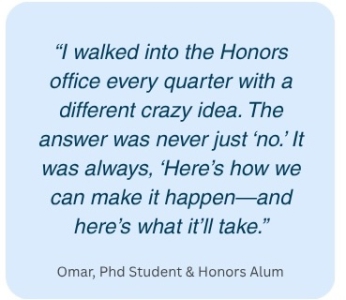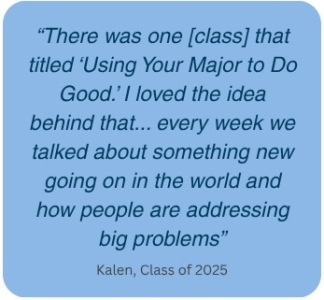College Honors
Enrich your Experience
College Honors
Enrich your Experience
Established nearly 50 years ago, and redesigned recently, the College Honors Program encourages and supports high academic achievement and individual excellence.
With help from Honors academic counselors and staff, continuing UCLA undergraduate students design cohesive, uniquely tailored undergraduate experiences by bringing together engagements inside and outside the classroom—including research, internships, community engagement, and entrepreneurial pursuits—that advance academic, personal, and professional aspirations.

College Honors at UCLA invites you to explore beyond boundaries—whether within your major or across fields that spark new interests. With flexible requirements and a wide range of seminar topics, the program opens doors to unexpected ideas, creative inquiry, and connections that shape your academic path in ways you might not have imagined.

The Honors framework encourages you to connect coursework with real-world impact. With guidance from faculty and academic counselors, you’ll take on experiences that challenge you to ask deeper questions, pursue independent inquiry, and reflect critically on your learning. Your time in the program culminates in a student-designed capstone that captures your academic voice and vision.

College Honors is more than a recognition—it’s a commitment to personal and academic transformation. In a community of driven and curious peers, you’ll learn to lead, collaborate, and push boundaries. The program helps you cultivate the habits of thought and action that lead to lifelong growth, purposeful impact, and meaningful achievement.

The College Scholars Program is for students who enter UCLA directly from high school and join the program early in their first year at UCLA. It is a structured, cohort-based, four-year experience. Comparatively, the College Honors Program is a more independently pursued experience where students tailor their engagements relative to their time remaining at UCLA. Both programs are grounded in our core approaches to learning, ways of being, and habits of doing. Both programs culminate with a student-designed capstone experience. Students who complete either program earn the “College Honors” distinction on their diplomas and transcripts.

The College Honors application continuing UCLA students opens once per year during the summer. This application is for students who have already begun coursework at UCLA and are interested in joining College Honors partway through their undergraduate career. This includes both first-year and transfer students.
Application Timeline
Eligibility
Students must:
Deadline: Summer 2026 (TBA)
Notifications: Application decisions are usually released after all applications have been reviewed. Please check back in late Spring quarter for full details and access to the application.
If you are an incoming transfer student, you may be eligible to apply if you:
Transfer Application Open: May 2026
Transfer Application Deadline: June 1, 2026, 11:59 PM (PST)
Application Status Available on MyUCLA: July 1, 2026
If you are TAP-certified from a participating California community college, you may apply via the College Honors Program transfer portal on MyUCLA following the same instructions as above.
If you do not meet the 3.75 GPA requirement, but are TAP-certified, you may apply via the TAP College Honors Program Application.
Transfer students from four-year institutions are not eligible for this program.
Application open: June 2026 (details to follow)
Deadline: TBA
We wish you the best in your collegiate journey, wherever it takes you!
40 units - Honors Coursework
40 units of total UCLA honors coursework with a grade of “B” or better, including:
*Honors Collegium courses, which are developed and offered specifically for honors students through the Honors Programs unit, are a central and longstanding feature of our undergraduate program. Collegium seminars emphasize interdisciplinary learning and offer rigorous educational experiences that are designed to hone your abilities to think critically and creatively, engage you in applying knowledge, and enhance your communication skills. Most of these seminar-style courses enroll no more than 15-20 students, which allows you to get to know your peers and your professors.
Examples of Honors coursework include:
Master List Course
Honors Contracts
Honors Seminars
PLATO Society Discussion Groups
Undergraduate Student Initiated Education (USIE)
Fiat Lux Seminars
2 Experiential Engagements
Experiential engagements provide direct, immersive experiences related to your academic interests or professional goals. Engaging in these activities will help create memorable and meaningful interactions on a deeper level, by providing ‘hands-on’ experience. Please note that experiential engagements must be approved by your counselor. Examples include:
1 Capstone
A capstone course allows you to demonstrate expertise in your major or area of study. It may range from a year-long sequence of courses or tutorials, an honors thesis, a comprehensive seminar project, or internship. Examples include:
3.5 cumulative UCLA GPA
To earn College Honors, students must maintain a minimum 3.5 cumulative GPA, calculated at the end of their final graded academic term at UCLA. This includes all coursework completed through the last quarter in which letter grades are received.
28 units - Honors Coursework
28 units of total UCLA honors coursework with a grade of “B” or better, including:
*Honors Collegium courses, which are developed and offered specifically for honors students through the Honors Programs unit, are a central and longstanding feature of our undergraduate program. Collegium seminars emphasize interdisciplinary learning and offer rigorous educational experiences that are designed to hone your abilities to think critically and creatively, engage you in applying knowledge, and enhance your communication skills. Most of these seminar-style courses enroll no more than 15-20 students, which allows you to get to know your peers and your professors.
Examples of Honors coursework include:
Master List Course
Honors Contracts
Honors Seminars
PLATO Society Discussion Groups
Undergraduate Student Initiated Education (USIE)
Fiat Lux Seminars
2 Experiential Engagements
Experiential engagements provide direct, immersive experiences related to your academic interests or professional goals. Engaging in these activities will help create memorable and meaningful interactions on a deeper level, by providing ‘hands-on’ experience. Please note that experiential engagements must be approved by your counselor. Examples include:
1 Capstone
A capstone course allows you to demonstrate expertise in your major or area of study. It may range from a year-long sequence of courses or tutorials, an honors thesis, a comprehensive seminar project, or internship. Examples include:
3.5 cumulative UCLA GPA
To earn College Honors, students must maintain a minimum 3.5 cumulative GPA, calculated at the end of their final graded academic term at UCLA. This includes all coursework completed through the last quarter in which letter grades are received.
Beyond Honors Collegium courses, you have a wide range of options for selecting honors-designated coursework that satisfy College Honors Program requirements. Your academic counselor will help you think through the various options that may enhance your learning and assist with academic program planning at different stages of your undergraduate career.
The Honors Collegium courses, which are developed and offered specifically for honors students through the Honors Programs unit, are a central and longstanding feature of our undergraduate program. Collegium seminars emphasize interdisciplinary learning and offer rigorous educational experiences that are designed to hone your abilities to think critically and creatively, engage you in applying knowledge, and enhance your communication skills. Most of these seminar-style courses enroll no more than 15-20 students, which allows you to get to know your peers and your professors.
Some courses that are offered regularly within academic departments (primarily upper division offerings) also fulfill College Scholars elective requirements. Honors Master List courses are designated as such based on their rigor; a design that promotes interaction between students and faculty; and extensive writing, reading, and/or critical analysis. Departmental honors courses and some upper division research courses are also included.
Honors Contracts are intended to enrich your learning experience by allowing you to pursue individual study beyond what is required of other students in a particular course. With faculty endorsement, you can enroll in a one-unit 89HC (lower-division) or 189HC (upper-division) adjunct to a main course with an agreed-upon (between you and the professor) scope of work.
Honors Seminars are one-unit adjuncts to primary lecture courses at lower and upper division levels. Course number 89 is reserved for lower division courses, and course number 189 is designated for upper division courses. These one-unit (non-“HC”) honors seminars are designed to provide students who are enrolled in a lecture course with opportunity to convene separately with a faculty member in a small-group setting. Seminars explore content beyond that which is addressed in the regular lecture course and discussion section.
Honors credit is offered for completing independent study coursework that engages you in working with faculty on research or other creative projects (i.e., courses numbered 197 through 199). Identify a faculty member you want to work with and inquire whether they are interested and available to supervise your work on a topic of particular interest. If they are, establish an approved research contract that will enable you to enroll in the designated independent study course by (a) concurring with the professor on a meeting schedule throughout the quarter and (b) preparing a summary of the project you will complete.
With approval from the Honors Programs unit, selected internship engagements in supervised community agency or business settings can also be used to fulfill College Scholars requirements. Individual contracts are required for these courses (numbered 95 or 195). Students meet on a regular basis with a faculty member and provide periodic reports of their experience. To earn Honors internship credit, the seminar/tutorial experience must satisfy selected requirements, including a final paper or project.
Need ideas for internship possibilities? In addition to options for students in specific majors, check upper division internship courses offered through the Center for Community Learning. The Career Center’s Handshake platform enables you to search for potential internship (and other employment-related) possibilities. Interested in politics and state or national public policy? Check out UC Center Sacramento and UCLA CAPPP Quarter in Washington D.C.
The PLATO Society of Los Angeles is a community of retired and semi-retired professionals dedicated to lifelong learning. Members meet weekly to explore topics in philosophy, literature, science, politics, and more, with each discussion led by a PLATO member.
Since 1986, the PLATO Society has invited one UCLA College Honors student per group to participate, offering a unique chance to engage in deep discussions with experienced professionals. While PLATO credit does not appear on transcripts or count toward degree requirements, it may fulfill College Honors/Scholars elective coursework.
CUTF seminars, which are sponsored through the Teacher and Learning Center are taught by advanced doctoral students who have considerable teaching experience, who have received excellent prior teaching assistant evaluations, and who are preparing for academic careers. Based on these students’ dissertation research, the roughly 19 CUTF seminars offered annually (enrolling roughly 25 students per seminar) enable undergraduates to learn about new research on a broad range of topics within a dialogue- focused learning environment. Many of these five-unit seminars, which are posted for reference on the Coursework Options page of the Honors Programs site, also satisfy selected General Education requirements.
UCLA offers more than 200 Fiat Lux Freshman Seminars annually as a cornerstone of the undergraduate curriculum. Since the seminars illuminate the many paths of discovery explored by UCLA faculty, the seminars take their name from the motto of the University of California: Fiat Lux — Let There be Light! These one-unit (pass/no pass) seminars, which span the rich array of fields studied at UCLA, provide students and faculty small group settings (average course size is 15 students) to engage in meaningful dialogue on a wide range of topics. A special series of 2020-2021 Centennial Fiat Lux Seminars showcases the university’s signature accomplishments and societal contributions. A max of 2-units may count towards Honors Progress.
USIE offers upper division students the opportunity to develop and facilitate a one-unit (pass/no pass) lower division seminar. Application and selection processes take place each spring quarter. During fall and winter quarters of the following academic year, students who are selected to serve as facilitators work closely with their faculty mentors in two one-unit independent study courses (one each quarter) focused on the content area of the student’s proposed seminar. To help prepare them for leading their spring quarter seminars, student facilitators also enroll in two one-unit pedagogy seminars (one each quarter) in which facilitation techniques are discussed.
Student Voices
The College Honors experience
Because I did Honors, I took classes and studied things that I would have never thought to study. Instead of it becoming a means to an end, I became very passionate about it. It forced me to really dig deeper.
This was an opportunity for me ..first generation in terms of going to school in the United States…the path that ended up being my path to law school, now looking back into how I even got into the UCLA Law school, one of the top law schools of the nation…College Honors ended up being the beginning of my story of how I was able to successfully graduate with highest Honors in History.. all of my accolades really originated to me joining the College Honors program.
